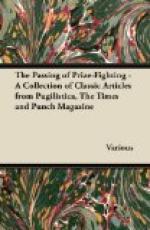[Illustration: Robinson. “IT’S ABOUT TIME YOU CHAPS STARTED TO DO SOMETHING. HARD WORK NEVER KILLED ANYBODY.”
Mendicant. “YOU ARE MISTAKEN, SIR. I LOST THREE WIVES THROUGH IT.”]
* * * * *
WIZARDS: KLINGSOR AND ANOTHER.
“Another Parsifal ought to be written from the angle of Klingsor, who was an enlightened Arabian, physician, scientist and probably Aristotelian.... The Knights, and Wagner with them, call him a wizard, which was a crude mediaeval way of ‘slanging’ any man who preferred knowledge to superstition.”
This remarkable utterance by the musical critic of The Daily Mail in the issue of February 25th has created a sensation in the political world fully equal to that caused by the announcement of Mr. ASQUITH’S return for Paisley. Scientific and artistic circles have also been deeply moved.
Sir PHILIP SASSOON, Mr. LLOYD GEORGE’S new secretary, interviewed by our representative, said that the tribute to his chief was all the more welcome considering its source. His only criticism was that, instead of calling the charge of wizardry a “crude mediaeval” mode of invective, he should prefer to style it an ultra-modern application of the art of obloquy.
Sir OLIVER LODGE, in a wireless message from New York, entirely approved of The Daily Mail’s reading of KLINGSOR’S character. He was clearly a scientist and a spiritualist of remarkable attainments. The defection of Kundry to the side of the Knights was a sad instance—but not without modern parallels—of the unrelenting pressure exerted on weak women by the zealots of orthodoxy.
Mr. A.B. WALKLEY said that he had long suspected KLINGSOR of being a crypto-Aristotelian, but the arguments of the writer in The Daily Mail had converted his suspicion to a certainty. He proposed to deal with the matter more fully in an imaginary dialogue between KLINGSOR and Sir OSWALD STOLL (who was a devout follower of HERBERT SPENCER) which would shortly appear in The Times.
Mr. DEVANT professed himself delighted with the vindication of KLINGSOR, who was undoubtedly, like ROGER BACON, a first-rate conjurer, far in advance of his time, and with limited resources was yet capable of producing illusions which would not have disgraced the stage of St. George’s Hall.
The Archbishop of CANTERBURY excused himself from pronouncing a definite opinion on the subject, but pointed out that it would doubtless come within the purview of the inquiry into Spiritualism undertaken by high clerical authority.
Mr. JACOB EPSTEIN made the gratifying announcement that he was engaged on a colossal statue of Mr. LLOYD GEORGE in the character of the modern Merlin. His treatment might not commend itself to the leaders of Nonconformity in Wales, but his own artistic conscience was clear, and he felt he could count on the benevolent sympathy of the Northcliffe Press.




